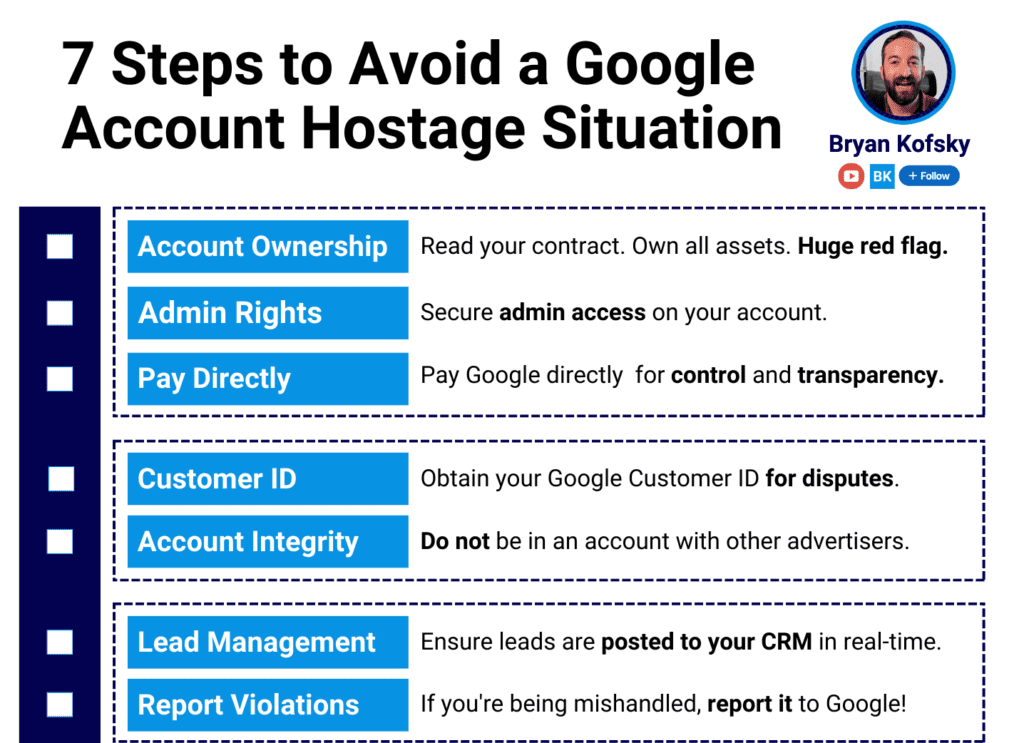When you hire a marketing agency to manage your advertising campaigns, you trust them to act in your best interest. Unfortunately, not all agencies operate ethically. Some engage in practices that can severely disrupt your business. In this post, I’ll shed light on these practices and provide actionable steps to protect your business.

Unethical Practices: A Real-Life Scenario
Here’s a real-life example (without specific client details for confidentiality). We were onboarding a new client whose former agency promised to transfer all their materials and assets to us by a certain date. Anticipating potential issues, we built backup campaigns from scratch. Just a day before the handoff, the agency informed the client they wouldn’t transfer the assets or the Google account. Fortunately, our newly created campaign outperformed theirs, despite having no account history. This wasn’t the ideal approach. We would have preferred to optimize the existing account for potentially even better performance with the benefit of historical data. The agency’s refusal seemed driven by self-serving motives rather than any legitimate reason like outstanding payment.
Long-Term Impacts of Unethical Practices
Working with an unethical agency can have serious long-term consequences. Initially, their actions might seem minor, but over time, you’ll find their interests conflict with yours. They may make it difficult for you to leave, effectively holding your accounts hostage. Moreover, you might miss significant opportunities by not working with an ethical agency sooner. Being proactive is crucial—either prevent these situations or have a well-thought-out exit plan.
If you’re even questioning your overall digital marketing strategy, you can also read more about selecting the best lead generation channels based on your goals, for a fresh perspective.
Verifying Compliance with Google’s Third-Party Advertising Policy
To ensure your agency complies with Google’s third-party advertising policy, follow these steps:
- Consult an Expert: I’d be happy to offer my expertise (at no obligation).
- Read the Policy and Your Contract: Familiarize yourself with Google’s third-party advertising policy and thoroughly review your contract.
- Use my Checklist: download my checklist to confirm as a quick guide before signing a contract.
- Red Flags: Be wary if the agency doesn’t want you to pay Google directly. Your Google spend should be invoiced directly from Google or charged to your credit card.
Steps to Take if Your Agency Withholds Your Google Ads Customer ID
If you discover that your agency is not providing the customer ID for your Google Ads account, take immediate action:
- Report to Google: Google Ads third-party policy violations
- Seek a Reputable Agency: Start looking for a reputable agency.
- Ensure Direct Billing: Insist that Google bills your credit card directly. Inform the agency of your new internal payment policy for advertising spend.
- Reach Out for Help: Feel free to contact me. I’m happy to guide you through the process.
Benefits of Owning Your Google Ads Account
Owning your Google Ads account from the start offers long-term benefits:
- Control: You maintain control over your account, ensuring a balanced relationship with your agency.
- Transparency: It indicates that the agency is transparent and has your best interests in mind.
Raising Awareness of Unethical Agency Practices
Surprisingly, I’ve encountered three large agencies, including two general and one in the EDU sector, that engage in these unethical practices. This prevalence is concerning. To raise awareness:
- Share This Blog Post: Inform your team and contacts.
- Check Your Agreements: Regularly review your contracts and agreements.
- Speak Up: Discuss these issues within the industry at conferences and other events.
